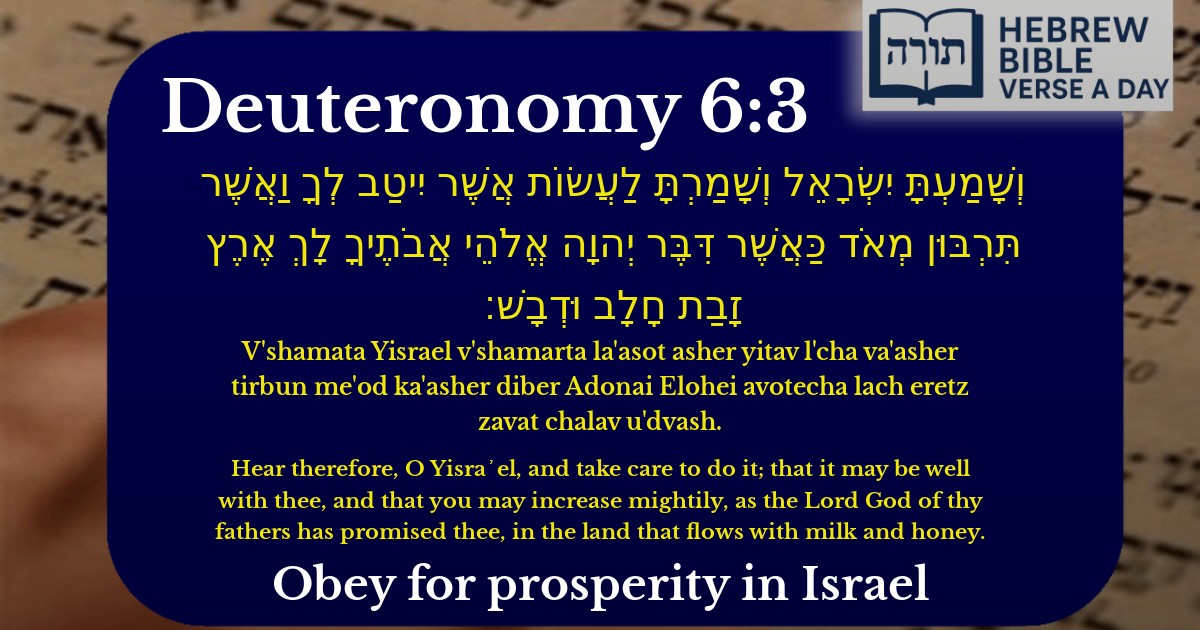Join Our Newsletter To Be Informed When New Videos Are Posted
Join the thousands of fellow Studends who rely on our videos to learn how to read the bible in Hebrew for free!
Hebrew Text
וְשָׁמַעְתָּ יִשְׂרָאֵל וְשָׁמַרְתָּ לַעֲשׂוֹת אֲשֶׁר יִיטַב לְךָ וַאֲשֶׁר תִּרְבּוּן מְאֹד כַּאֲשֶׁר דִּבֶּר יְהוָה אֱלֹהֵי אֲבֹתֶיךָ לָךְ אֶרֶץ זָבַת חָלָב וּדְבָשׁ׃
English Translation
Hear therefore, O Yisra᾽el, and take care to do it; that it may be well with thee, and that you may increase mightily, as the Lord God of thy fathers has promised thee, in the land that flows with milk and honey.
Transliteration
V'shamata Yisrael v'shamarta la'asot asher yitav l'cha va'asher tirbun me'od ka'asher diber Adonai Elohei avotecha lach eretz zavat chalav u'dvash.
Hebrew Leining Text
וְשָׁמַעְתָּ֤ יִשְׂרָאֵל֙ וְשָׁמַרְתָּ֣ לַעֲשׂ֔וֹת אֲשֶׁר֙ יִיטַ֣ב לְךָ֔ וַאֲשֶׁ֥ר תִּרְבּ֖וּן מְאֹ֑ד כַּאֲשֶׁר֩ דִּבֶּ֨ר יְהֹוָ֜ה אֱלֹהֵ֤י אֲבֹתֶ֙יךָ֙ לָ֔ךְ אֶ֛רֶץ זָבַ֥ת חָלָ֖ב וּדְבָֽשׁ׃ {פ}
Parasha Commentary
📚 Talmud Citations
This verse is quoted in the Talmud.
📖 Berakhot 40b
The verse is referenced in a discussion about the blessings of the land of Israel and the importance of observing the commandments to merit these blessings.
📖 Ketubot 111b
The verse is cited in the context of the promises made to the Jewish people regarding the land of Israel, emphasizing its fertility and abundance.


Context in Sefer Devarim
This verse appears in Parashat Va'etchanan (Devarim 6:3), following the Aseret HaDibrot (Ten Commandments) and preceding the first paragraph of the Shema. It serves as a bridge between the foundational commandments and the call to internalize Torah observance in daily life.
Rashi's Explanation
Rashi emphasizes the cause-and-effect relationship in the verse: "And you shall hear" leads to "and you shall observe to do," which in turn brings about the promised blessings. He notes that the phrase "as the Lord God of your fathers promised you" refers back to the covenant with Avraham (Bereishit 15:5) regarding numerous descendants and the promise of Eretz Yisrael.
Ibn Ezra on "Hear" and "Observe"
Ibn Ezra distinguishes between shemiah (hearing/understanding) and shemirah (observing/doing). True comprehension of Torah must lead to practical observance. The doubling of verbs teaches that intellectual acceptance alone is insufficient without actual performance of mitzvot.
Sforno on National Prosperity
Sforno explains that the blessings of prosperity ("that it may be well with you") and population growth ("that you may increase mightily") are conditional upon Torah observance. He connects this to the agricultural bounty of Eretz Yisrael, where proper observance of mitzvot (especially those dependent on the land) directly impacts material success.
Land of Milk and Honey in Rabbinic Literature
Halachic Implications
The verse establishes several important principles in Jewish thought: